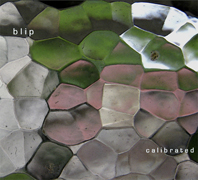: blip (jim denley, mike majkowksi)
splitrec, CD20
www.splitrec.com
Blip, Calibrated
There is always a certain sense of paradox about improv recordings. As Jim Denley (one half of Blip with Mike Majkowski) notes: “However entangled in the moment when generated, the finished products are compositions…reviewed, edited, mixed, mastered, fixed, made repeatable and generally fussed over” (‘Networks, Playfulness and Collectivity: Improv in Australia, 1972-2007’, Experimental Music: Audio Explorations in Australia, ed G Priest, UNSW Press 2009).
Interestingly the CD notes reveal Calibrated to be the sixth attempt to record this musical relationship, which has been developing since 2008. So while the album offers the first 42 minutes of a two-hour session as it happened, in the moment and unedited, the process of spontaneous music making together with the idea of a fixed recorded outcome, is in fact well rehearsed.
The result of these rehearsals is a very clear sense of engagement, or entanglement as Denley calls it, between the two artists. Over the three tracks, Denley (alternating between alto sax and flutes) and Majkowski (on double bass, pitch pipes, objects and voice) traverse an evershifting terrain, without losing sight of each other, or their individual footing.
Track 1, “Pod,” explores quiet sparse textures, mixing Denley’s spittle-filled wash with Majkowski’s faraway strangled vocals. A half-melody from Denley, almost a by-product of other activities, merges with the reediness of Majkowski on pitch pipe, which he plays simultaneously with quiet percussive bass bowing. A sense of turn taking, or question and answer develops as plucks and tongue tocks stab at each other, culminating in a long, multi-tonal note from Denley.
Track 2, “Oat”, thickens up the tonal material from “Pod,” with Majkowski making long low whooping sounds by rubbing his hand over the body of the bass which interplay with Denley’s hollow reedy tones. Deep bass bowing creates a sense of tension, while the application of a balloon to the bass induces a kind of chirping over which Denley concludes with mournful, gliding sax squeals.
Tracks 1 and 2 are relatively short so by the final 21-minute track, “Branes,” the duo is primed. Majkowski starts suddenly with the harsh, sustained rattles produced by applying a plastic cassette case to the bowed strings, sounding like a castanet player on speed. Denley counters with impossibly long flute notes that devolve into a quasi-syllabic play heightened by Majkowski with intense skittering of the bow over the strings. At one juncture they explore pitch extremes: Majkowski drags out low bass notes as Denley produces piercing piccolo peeps. At another Majkowski introduces bell tolls with each pluck of a bass string, while Denley emulates a kind of digital serialism on overblown flute. As often happens the ending that presents itself is ignored creating an epilogue of sax death throes with a definitive hard-edged stop. It’s been quite a journey.
An important element to capturing the spontaneous nature of this kind of music is to maintain a sense of the room in which the moment is recorded, and the clear miking of Denley in the left channel and Majkowski in the right is unfussy. It allows for a sense of orientation, particularly helpful as it seems that Majkowski can produce woodwind-like sounds, and Denley can produce string timbres. Of course, mixing this up and fusing the sound sources might offer an intriguing sensory complication. Having seen these artists play live, I have a clear idea of the extended techniques involved in the making of many of the obscure sounds, but I wonder how a listener without the memory of the gestures of performance would experience the recording—perhaps it would make the textural and timbral material even more heightened. With or without prior experience of these artists live, however, it is impossible not to appreciate that the music-making undertaken on Calibrated is part of a rich and ongoing conversation between two of Australia’s most engaging improv artists.
Gail Priest






